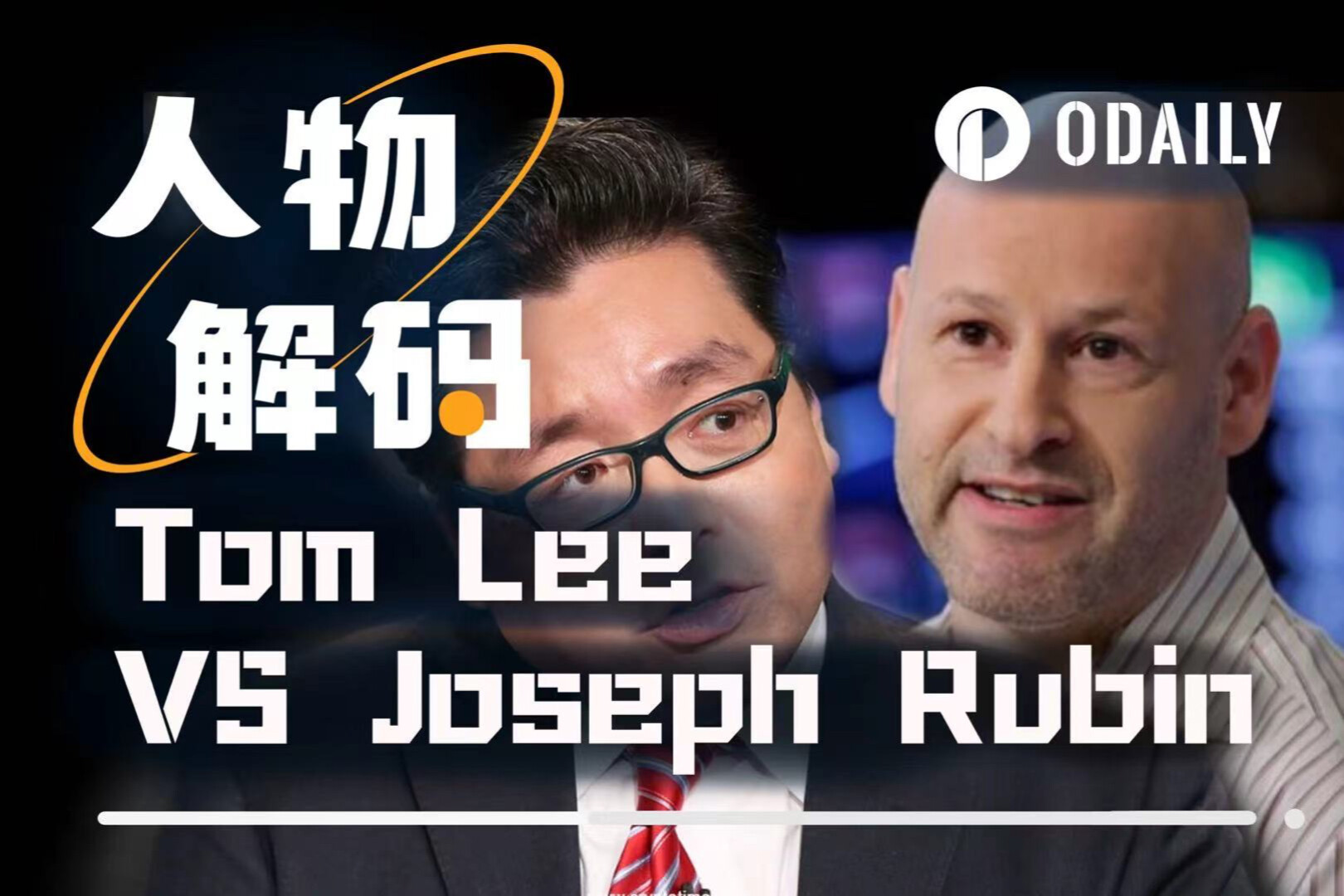Written by: Vitalik Thought Institute
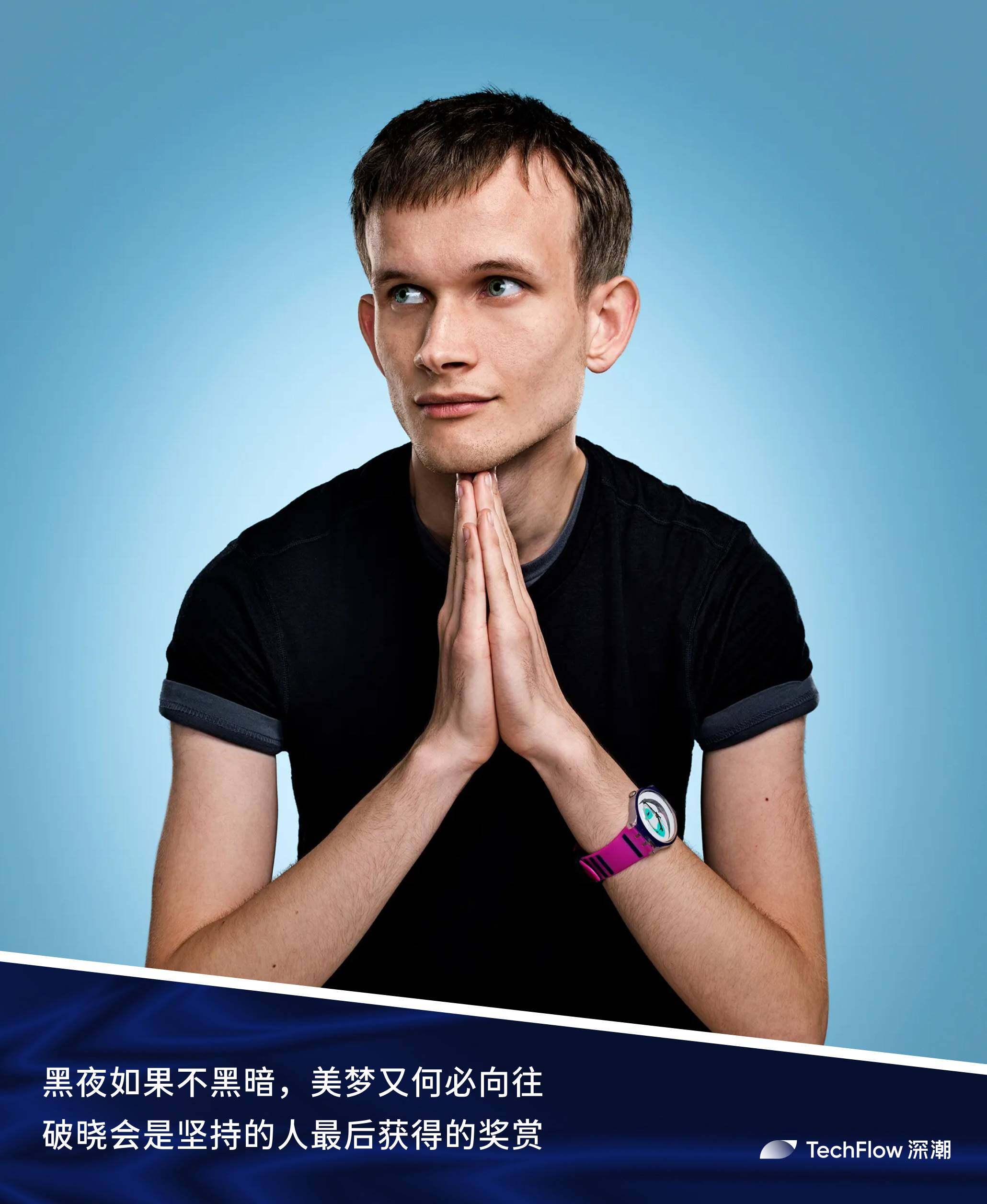
On July 30, 2015, the Ethereum mainnet was launched.
Bitcoin grew spontaneously like a myth, depersonalized and unrewritten; Ethereum, on the other hand, is like an unfinished script whose author never leaves the stage.
Vitalik Buterin, a technological idealist who became famous at a young age, has spent ten years injecting his personal philosophy, values and struggles into his code.
From the initial vision of "world computer" to the reflection on governance under the DAO crisis, from the merger to the profound transformation of the foundation... every evolution of Ethereum bears the traces of Vitalik's thinking.
The ten years of Ethereum are also a history of the evolution of Vitalik’s thoughts.
Genius' Utopia
In 2008, a financial crisis brought an unprecedented storm.
As banks collapsed and trust crumbled, Bitcoin emerged, sounding the clarion call for rebellion against the old ways. This emerging technology not only captivated geeks and cryptography enthusiasts, but also changed the life trajectory of one young man: Vitalik Buterin.
Since ancient times, heroes have emerged from youth. At the age when most people encounter love, 17-year-old Vitalik encountered Bitcoin.
In 2011, he learned about Bitcoin from his father, a computer scientist, and after giving up World of Warcraft, Bitcoin became Vitalik's new hobby.
He began searching Bitcoin forums online until he found someone who was willing to pay him for his articles in Bitcoin. At that time, he could earn 5 Bitcoins for each blog post he published.
Vitalik’s articles quickly caught the attention of Romanian Bitcoin enthusiast Mihai Alisie. The two began corresponding and co-founded Bitcoin Magazine in late 2011.
In 2013, Vitalik used the Bitcoin he earned from his articles to travel around the world, visiting local Bitcoin enthusiasts in Israel, London, San Francisco, Los Angeles and other places. When he returned to Toronto, he was extremely convinced that everyone's understanding of Blockchain 2.0 was completely wrong.
Because they all tried to build complex applications on Bitcoin, but Bitcoin script functions were too limited.
Vitalik realized that if he wrote a version of Bitcoin with a Turing-complete programming language, the network could provide all digital services, replicate social networks on the blockchain, restructure the stock market, and even build completely digital companies, free from the jurisdiction of any government entity.
In November of the same year, 19-year-old Vitalik turned his idea into a white paper and gave it a name: Ethereum.
This white paper quickly swept the entire crypto community, and for the first time people realized that blockchain could be more than just a currency, but also a global decentralized platform.
Co-founders such as Joseph Lubin and Gavin Wood joined in, with Lubin even calling him a "genius alien who brought the gift of decentralization."
At that time, Vitalik was an extremely pure idealist. In an interview, he did not shy away from saying that he held a dualistic worldview and believed that most social ills were due to centralized power. "I regarded anything involving government regulation or corporate control as pure evil."
However, there is always a gap between idealism and reality.
Disagreements first erupted within the team. Some co-founders wanted Ethereum to become a profitable commercial entity, while Vitalik preferred to stick with a non-profit, open community model. He even proposed reducing his and other co-founders' ownership of Ethereum to avoid future concentration of power.
In June 2014, the conflict reached its peak.
Vitalik asked Charles Hoskinson and Amir Chetrit to leave the team and established the Ethereum Foundation (EF) that same year, establishing a non-profit governance direction. That same year, Gavin Wood also left due to disagreements with Vitalik over development priorities and non-profit direction, and founded Polkadot in 2020.
In an interview with TIME, Vitalik admitted that Ethereum’s transformative vision is at risk of being overwhelmed by greed:
“If we don’t make our voices heard, the only things that will be built are those that are immediately profitable, and they’re often not what the world truly needs.”
On July 30, 2015, dozens of young developers witnessed the automatic launch of the Ethereum mainnet in a small Berlin office. There were no lavish celebrations, no extensive media coverage, just a group of idealists quietly watching blocks tick by on their screens.
The vision of "World Computer" has moved from white paper to reality.
However, behind the halo, young Vitalik was not prepared for the more complex and cruel real world.
Ideal Crack
In the early years of Ethereum, Vitalik was more of a pure techno-utopian. He firmly believed that the ultimate meaning of blockchain lies in decentralization, and emphasized that anyone can freely build applications on Ethereum without the approval of a central authority.
At Devcon 1 in 2015, Vitalik repeatedly emphasized the open and trustless nature of Ethereum, depicting an ideal world dominated by code rather than power.
But decentralization doesn't automatically mean everything is better. Vitalik, while opposing centralization, inevitably became the ultimate arbiter of community opinion. This subtle power paradox was amplified during the subsequent DAO crisis.
In 2016, The DAO, the world's first decentralized investment fund, ran on Ethereum, raising over 12 million Ethereum worth $150 million. However, in June, a hacker exploited a smart contract vulnerability and stole approximately 3.6 million ETH.
That year, Vitalik was only 22 years old and had just gotten used to being called "V God." After the crisis broke out, he worked almost non-stop every day to communicate with the community, develop plans, and try to remedy the situation.
The urgent need to protect investor assets clashed with the technological creed of decentralization. Ultimately, Vitalik chose a compromise and pragmatic approach: advocating for a hard fork to recover the stolen funds and letting the entire community vote.
This decision successfully stabilized the market and also caused the former Ethereum to split into today's ETH and ETC.
During this crisis, Vitalik lost not only his sleep, but also his confidence in the "perfect execution" of smart contracts and his originally "perfect" image as a leader. It was also because of this incident that the "saint" who had 100% trust in technology disappeared, and a more pragmatic Vitalik took the road.
After the DAO crisis, Vitalik acknowledged the gap between ideals and reality in his blog post, "Thinking About Smart Contract Security." He proposed the need for more rigorous security audits and formal verification. He also began discussing governance issues in public speeches, emphasizing that "community collaboration," rather than technological absolutism, was the key to Ethereum's success.
The crisis brought about reflection, but the market quickly entered a period of speculative frenzy, bringing a heavy burden to the network.
In 2017, ICOs (Initial Coin Offerings) became a phenomenal fundraising method, with projects like EOS, Tezos, and Bancor easily raising hundreds of millions of dollars on Ethereum. Later that year, the NFT game CryptoKitties, driven by a surge in users, caused severe congestion on Ethereum, with gas fees exceeding 800 Gwei. Vitalik realized that if scalability issues were not addressed, Ethereum would struggle to achieve its vision of universal access.
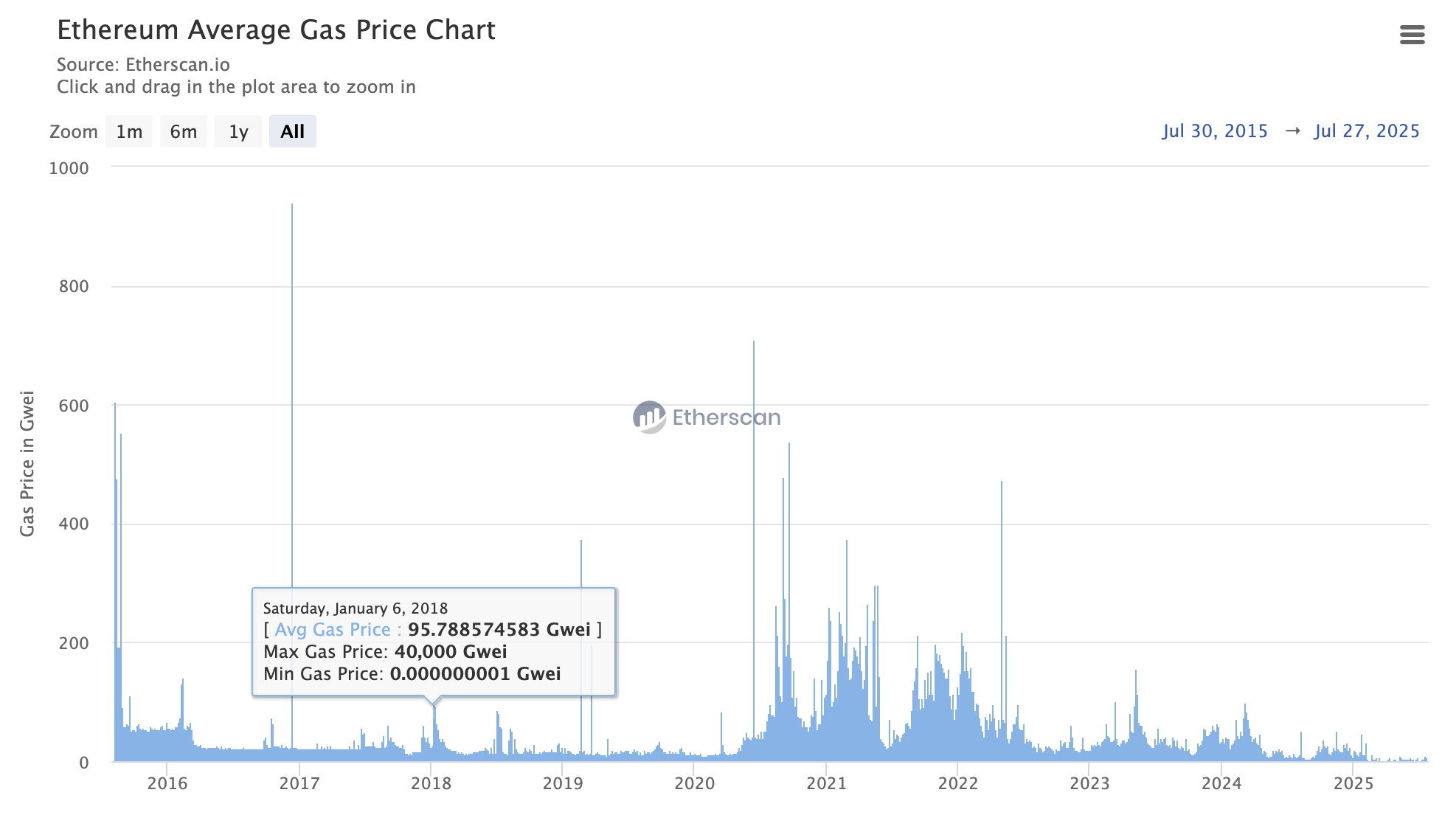
In the interview, he made no secret of his disappointment with the speculative nature of the industry:
“Many projects appear to be decentralized, but they are just rebranded. We must prove that the reason for the existence of blockchain is truly superior to traditional technologies (such as Excel spreadsheets).”
The craze soon faded, and the entire crypto market collapsed in 2018. ETH fell from $1,400 to $83, and a large number of ICO projects died out.
During this period, Vitalik kept thinking about how to bring blockchain back in a meaningful direction.
In 2018, he co-published "Liberal Radicalism: A Flexible Charitable Matching Mechanism Design" with Harvard scholar Zoë Hitzig and Microsoft researcher Glen Weyl, proposing a quadratic voting mechanism, hoping that truly valuable public goods would receive resource support through a public funding model, rather than being dominated by short-term speculation.
In response to problems such as network congestion caused by insufficient scalability, Vitalik and community developers proposed EIP-1559, introducing a dynamic gas fee mechanism to push Ethereum from Proof of Work (PoW) to Proof of Stake (PoS) to reduce energy consumption and increase transaction throughput.
The DAO crisis, speculative bubble, and price crash caused Vitalik to undergo a profound shift in his thinking. He went from a "tech saint" pursuing the ultimate in decentralization to a builder who must consider security, governance, and social value.
Ethereum is still his utopia, but it is no longer a pure technological paradise, but a rugged road of reality that requires compromise, trade-offs and a broader vision.
Vitalik gradually found his own pragmatic philosophy in this process.
The battlefield beyond code
If Vitalik experienced a shift from pure technological idealism to pragmatism between 2015 and 2019, then between 2020 and 2022, he underwent another crucial shift in his thinking: he began to confront the complexity of the real world, moving from purely technical ideals to a multidimensional approach that balanced social governance, public responsibility, and real-world politics. The Russo-Ukrainian war, in particular, led him to leverage his influence to confront politics head-on.
In August 2020, he proposed in his blog post "Trust Models" that blockchain can never be completely "trustless" and that the social contracts and power relations in reality cannot be completely eliminated. This is in stark contrast to his early idea of completely replacing human consensus with code.
In 2021, Vitalik criticized the single token voting governance model in his blog post "Moving Beyond Coin Voting Governance", believing that capital weight should not be the only decision-making logic, and called for the establishment of a diversified consensus and soft governance mechanism in an attempt to make blockchain more in line with the decision-making logic of human society.
An idealist, further integrated into reality.
2022 is the year when Ethereum and Vitalik face a huge challenge - the merger.
The transition from PoW to PoS consensus mechanism was not smooth. Many former Ethereum community members criticized PoS for further concentrating power in the hands of large capital holders. Some miners and node operators expressed dissatisfaction with the abandonment of the PoW mining model, which they had painstakingly maintained for many years.
Cardano founder Charles Hoskinson even described Vitalik as the dictator of Ethereum. He criticized Ethereum as a "dictatorship" and said that Vitalik holds too much power.
Despite this, Vitalik and the Foundation remained steadfast in their pursuit of the merger. On September 15th, Ethereum officially completed the merger, effectively dethroning PoW.
Vitalik emphasized that this upgrade not only dramatically reduces PoW energy consumption (about 99.95% reduction), but also lays the foundation for future steps such as Sharding and Rollup expansion, making it possible to exceed thousands or even tens of thousands of transactions per second in throughput.
In response to the "dictator" claim, he said that Ethereum's governance relies on community consensus rather than single-person decisions, and all major changes are subject to EIP, core developer meetings and public discussions.
In February of the same year, the Russo-Ukrainian War broke out.
Vitalik, who is of Russian descent and was born in Moscow, rarely broke his "neutrality" and condemned Putin in Russian on Twitter, calling it a "crime against the Ukrainian and Russian people" and wrote the widely circulated words: "Ethereum is neutral, but I am not."
Just a few weeks later, Vitalik extended a helping hand to Ukraine through crypto donations, donating a total of 1,500 ETH (approximately $5 million) to the Unchain Fund and Aid for Ukraine for humanitarian and military support.
In September of the same year, he went to Kyiv to attend the Kyiv Tech Summit and ETHKyiv Hackathon to express his support for Ukraine.
“I wanted to see firsthand the Ethereum project, which is still thriving amidst the war, and get to know the developers behind it,” he said. “Ukraine could become the next Web 3 hub.”
“Just focus on building Ethereum, why get involved in politics?”
Vitalik faced criticism again, but he didn't care at all. In an interview with Time, he admitted: "One of the decisions I made in 2022 was to try to be more adventurous and no longer remain neutral. I would rather Ethereum offend some people than become an empty shell that represents nothing."
This statement also indicates that the scope of Vitalik’s “offense” is still expanding, and social value has become the core of his focus. Even the NFT craze that benefited Ethereum that year could not escape Vitalik’s sharp criticism.
“If crypto is just about people buying and selling pictures of monkeys and getting rich, then it has no purpose.”
Especially after the collapse of Luna and FTX, Vitalik believes that the real problem in the crypto world is no longer the security and scalability of the underlying protocol, but how to realize social value at the application layer.
He appealed to the community to build decentralized applications that can improve public governance, finance public goods, and promote transparent financial instruments.
In the same year, in his blog post “What in the Ethereum application ecosystem excites me”, he listed the application directions he was most looking forward to:
- A scaling solution centered around Layer 2 and Rollup;
- Privacy protection technology based on zero-knowledge proof;
- DAOs driven by public goods funding mechanisms;
- Prediction markets and stablecoins that solve real-world problems.
After experiencing merger disputes, war shocks, speculative frenzy and industry collapse, Vitalik is no longer just a geek sitting behind the code. For the first time, he has taken the initiative to step forward and participate in public issues as an actor and thinker.
His ideal country began to take on a new outline: it was not only a technical architecture, but also a multi-dimensional experimental field where governance, freedom and public values coexisted.
Dawn breaks in the darkness
After the Merge is completed, Ethereum's technical route enters a stable period.
At this moment, the NFT craze has receded, the DeFi craze has dissipated, and the crypto industry has been caught in the anxiety of "no new narrative". During this stage, Vitalik has continued to promote the concept of public goods funding and information finance:
- Support open source development and community governance through Gitcoin and quadratic funding mechanisms;
- Explore prediction markets and data finance tools to make information a valuable and incentivized asset;
- Advocate for more decentralized applications to focus on social issues and public governance rather than being pure hype tools.
At the same time, ChatGPT has driven the AI wave across the world, and the Silicon Valley tech community is embracing "effective accelerationism (e/acc)", believing that technology and innovation should be as fast as possible, and is optimistic and welcoming of AGI.
Vitalik, however, took a different approach, proposing a prudent approach: "defensive acceleration (d/acc)." He advocated that technological development should prioritize defense and protect democracy and a decentralized order, a move that aligns closely with the original aspirations of Ethereum. In his blog post, "My techno-optimism," he warned of the centralization risks of AI: "A government controlled by 45 people could control the fate of billions of people."
The awakening brought by AI and the development of Ethereum are intertwined in Vitalik's mind. In "Make Ethereum Cypherpunk Again", he calls on Ethereum to regain the early spirit of encryption: privacy protection, open source collaboration, and decentralized power.
He further emphasized this point during the interview: Ethereum is not an institutional tool, but rather an infrastructure for individual empowerment. Its purpose is to resist the centralization of power, not to become a new centralized order.
However, there is always a gap between ideals and the market.
In 2024, the crypto market failed to follow Vitalik's lead and instead headed in the direction he criticized. The technical narratives he championed, such as privacy and Layer 2, were ignored by the market, leading to a prolonged slump in ETH prices. Instead, MEME took center stage. Solana, with its high performance and explosive growth in the MEME ecosystem, was hailed by some investors as the "new Ethereum."
The market began to circulate with rhetoric that "Ethereum is outdated" and "the Foundation has lost its innovativeness." The Chinese community was even more critical: the Foundation was accused of frequently selling ETH, neglecting developer support, having conflicts of interest between researchers and external projects, and Vitalik being surrounded by flattering eunuchs...
Vitalik didn't hide his frustration at X: Crypto Twitter and VCs considered "a KOL bet where 99% of users lost money" the best product in the industry; the outside world, completely unaware of the foundation's inner workings, demanded a complete overhaul within two weeks. These voices briefly made him consider quitting, but every time he felt like giving up, there were signs reminding him it was worth fighting on:
“Don’t deny yourself, make yourself unshakable.”
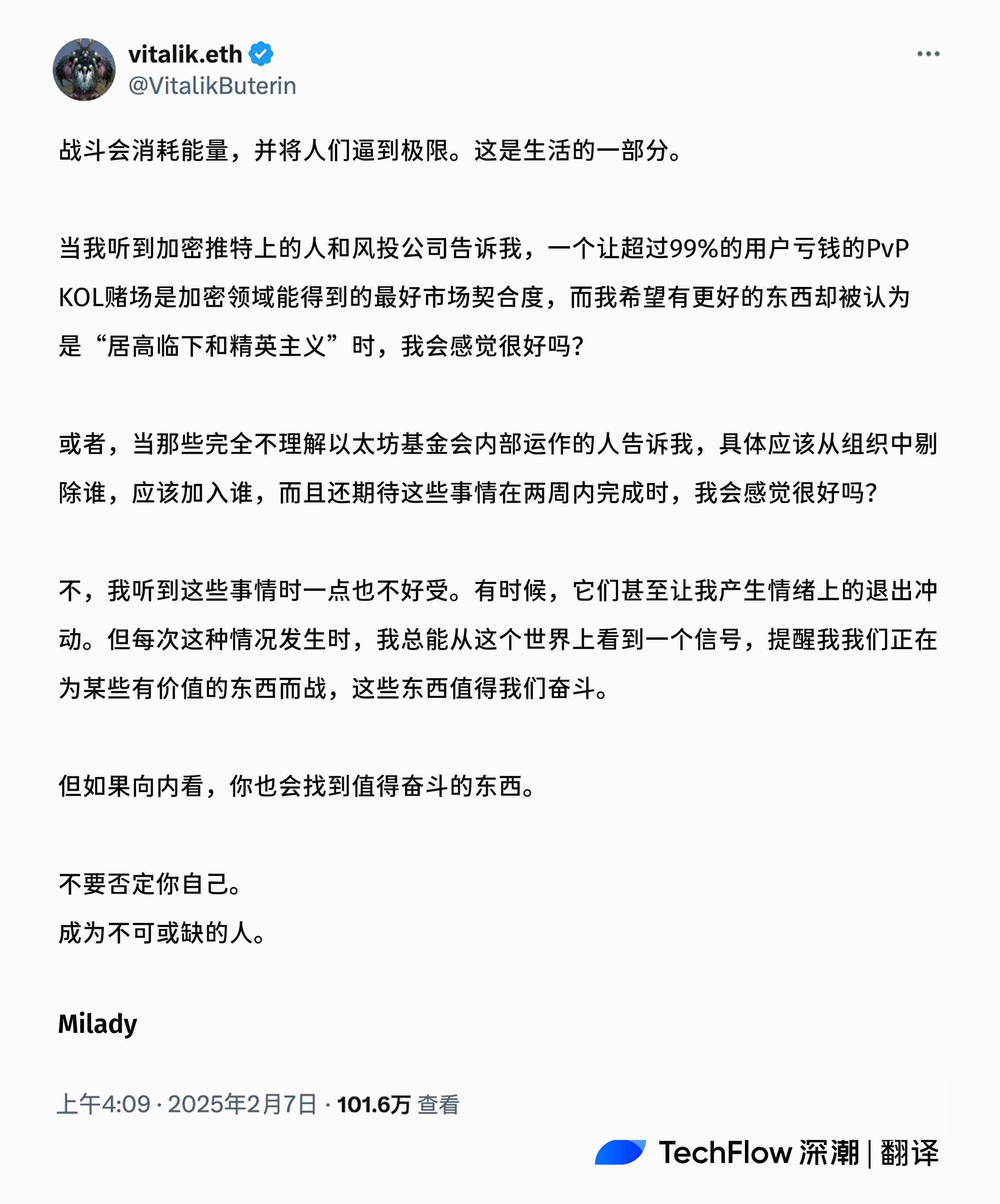
The criticism remains, but change is happening.
In January 2025, Vitalik made a statement on X to overhaul the leadership structure of the Ethereum Foundation. In March, the Ethereum Foundation announced major personnel adjustments:
Former Executive Director Aya Miyaguchi transitions to become Foundation President;
Hsiao‑Wei Wang and Tomasz Stańczak were promoted to new co-executive directors;
Core researcher Danny Ryan founded a new experimental organization Etherealize to accelerate the implementation of technology.
Good times are coming, and with Circle's listing and the rise of stablecoins and RWA concepts, Ethereum, as a core infrastructure, has once again become the focus.
ConsenSys founder Joseph Lubin launched an "ETH reserve" through his US-listed company, SharpLink Gaming (SBET), becoming the "MicroStrategy of Ethereum." Companies like BitMine, Bit Digital, and GameSquare followed suit, and the race for ETH reserves began.
The price of ETH has doubled since April and increased by 40% in July alone. The market seems to have forgotten the doubts about Ethereum a few months ago.
Vitalik did not explicitly agree or deny the "micro-strategy" model, but at EthCC in early July, Vitalik Buterin once again issued his industry warning: Web 3 is at a crossroads, and unless developers anchor their work on freedom, decentralization, and privacy, the industry risks betraying its founding principles.
“Ethereum is at a critical juncture,” he said. “The decentralization dream that fueled the blockchain revolution is now being eroded by corporate involvement, political attention, and user convenience.”
July 30th marks the 10th anniversary of Ethereum’s launch.
Vitalik X’s homepage reposted Binji, a member of the Ethereum Foundation,’s “Ten Years of Reflection on Ethereum”:
“When banks fail, cloud services go down, and servers are patched, Ethereum keeps running. We keep moving forward. Ten years online, always moving forward.”
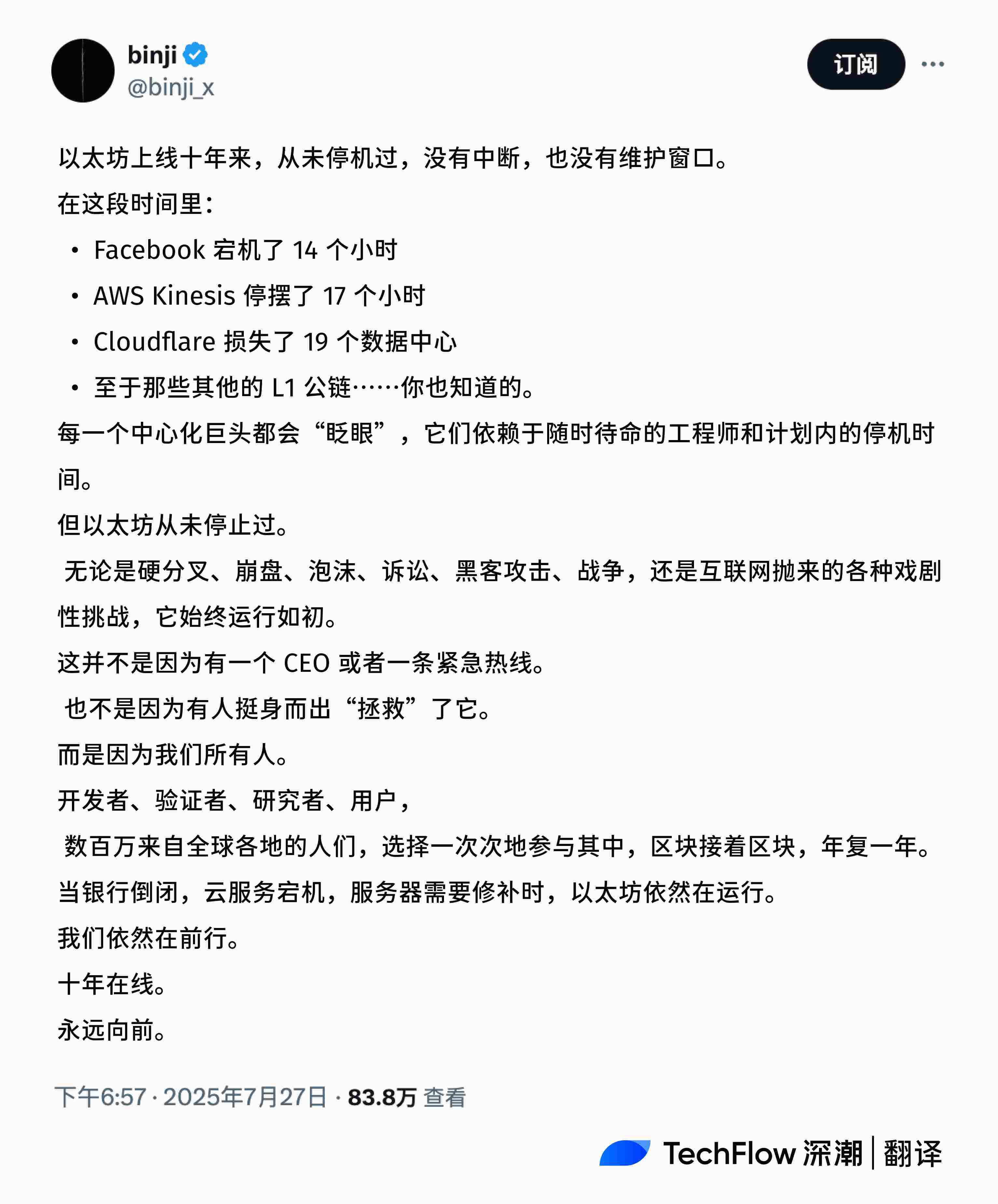
Interestingly, Vitalik recently reposted a lyric transcription of his favorite song from She-Her's song "Starlight":
If the night is not dark, why would we yearn for beautiful dreams?
Dawn will be the final reward for those who persevere
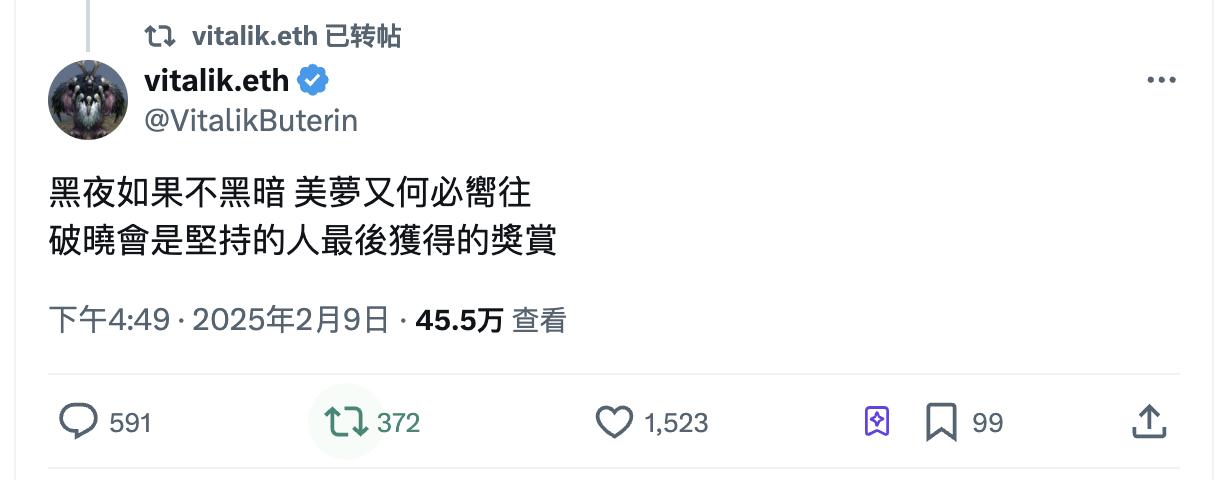
This seems to be the best footnote to the ups and downs of Ethereum and Vitalik over the past two years: in the darkness, he chose to persevere and wait for the dawn.
- 核心观点:Vitalik思想塑造以太坊十年发展。
- 关键要素:
- 2013年提出以太坊白皮书。
- 2016年DAO危机推动治理转型。
- 2022年完成PoS合并升级。
- 市场影响:推动区块链向实用价值发展。
- 时效性标注:长期影响。



